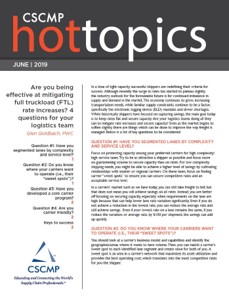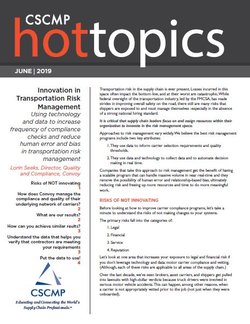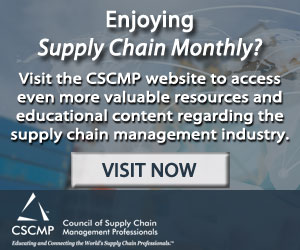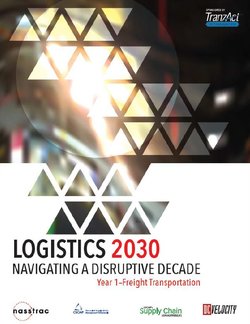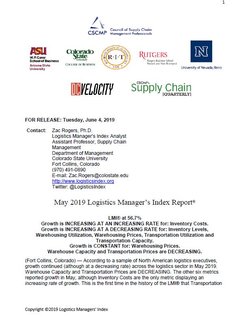|
The Council of Supply Chain Management Professionals (CSCMP) released the 30th Annual State of Logistics Report™ this morning during a press conference at the National Press Club in Washington, D.C., CSCMP collaborates with global strategic management consulting firm A.T. Kearney, as the author and researcher, and with Penske Logistics continuing its longstanding role as presenter of the report. Amid a booming economy, United States Business Logistics Costs (USBLC) rose 11.4% to reach $1.64 trillion, or 8% of 2018’s $20.5 trillion gross domestic product (GDP). The report notes that supply chain capacity is tight enough that a number of major companies have reported in their Securities and Exchange Commission (SEC) filings that they exceeded their 2018 supply chain budget spending. Click "Learn More" to access the report and learn: - Why supply chain costs are rising - How innovations drive today’s state-of-the-art supply chains “This highly anticipated report contains statistics and industry insights that will not only help our members do their jobs better, but also better prepare them for the business demands ahead. Not only do we definitively reveal the cost of logistics in the United States, but we also discuss technology and other forward-thinking applications for leaders to use as they improve their overall supply chain performance.”
- Rick Blasgen, president and chief executive officer of CSCMP Visit https://www.naylornetwork.com/cscm-nwl/articles/index.asp?aid=565956&issueID=66367 to view the full article online.
|
Please take a few minutes to complete the 2019 Council of Supply Chain Management Professionals (CSCMP) Annual Satisfaction/Perceptions Survey.
Feedback in this high-level satisfaction survey provides trending information to help us offer you the experience you desire within our association. Your participation is voluntary and confidential.
As a thank you for your time, all respondents will be entered into a drawing to receive a $100 gift card. Click the link below to get started.
We thank you for your contribution to our continued success!
Visit http://bit.ly/2wwl9bI to view the full article online.
Capacity in the domestic full truckload (FTL) market is as tight as it’s ever been. Although recently the surge in rates has started to plateau slightly, the industry outlook for the foreseeable future is for continued imbalance in supply and demand in the market. As a result, shippers must become more efficient in how they award lanes and become more attractive to carriers. The most mature shippers are implementing segmentation schemes and other processes that try to create win-win propositions for themselves and their carriers. This article looks at 4 things that all Supply Chain leaders should be asking their Logistics teams to be sure they are doing the things necessary to secure valuable capacity. Read CSCMP's latest Hot Topic, FTL Rate Increases? 4 Questions for Your Logistics Team, written by Glen Goldbach, PWC. Visit https://cscmp.org/store/detail.aspx?id=HT19-FTL to view the full article online.
|
Transportation risk in the supply chain is ever present. Losses incurred in this space often impact the bottom line, and at their worst are catastrophic. While federal oversight of the transportation industry, led by the FMCSA, has made strides in improving overall safety on the road, many risks remain that shippers are exposed to and must manage themselves – especially in the absence of a strong national hiring standard. It is critical that supply chain leaders focus on and assign resources within their organization to innovate in the risk management space. Approaches to risk management vary widely. We believe the best risk management programs include two key attributes: 1. They use data to inform carrier selection requirements and quality thresholds. 2. They use data and technology to collect data and to automate decision making in real time. Read CSCMP's latest Hot Topic, Innovation in Transportation Risk Management - written by Lorin Seeks, Director, Quality and Compliance, Convoy. Visit https://cscmp.org/store/detail.aspx?id=HT19-CONVOY to view the full article online.
|
